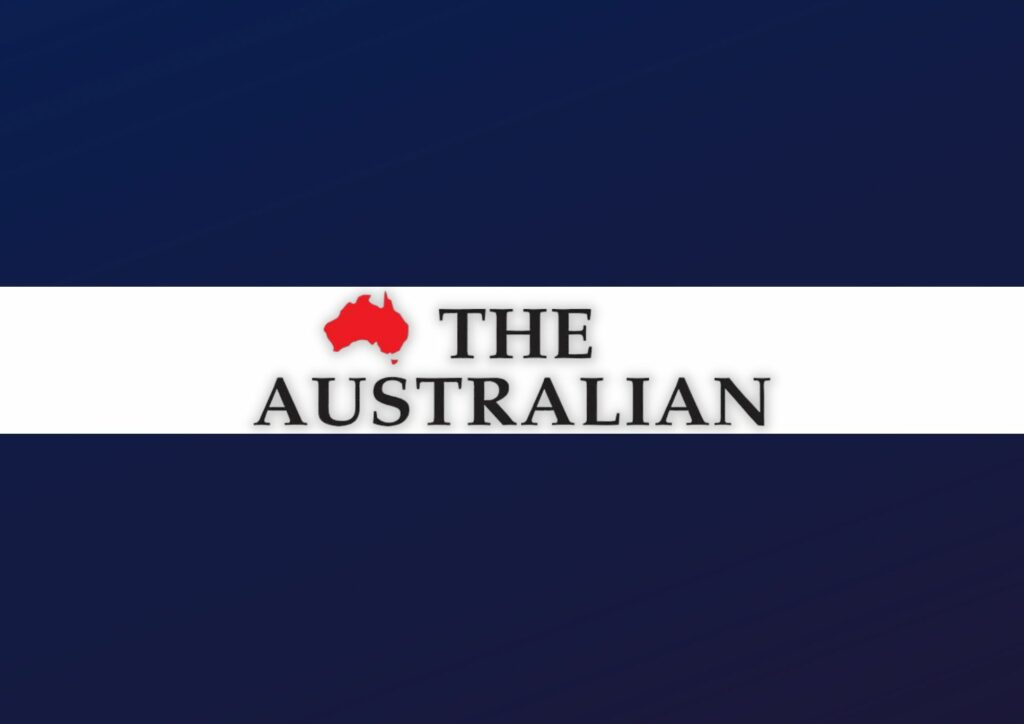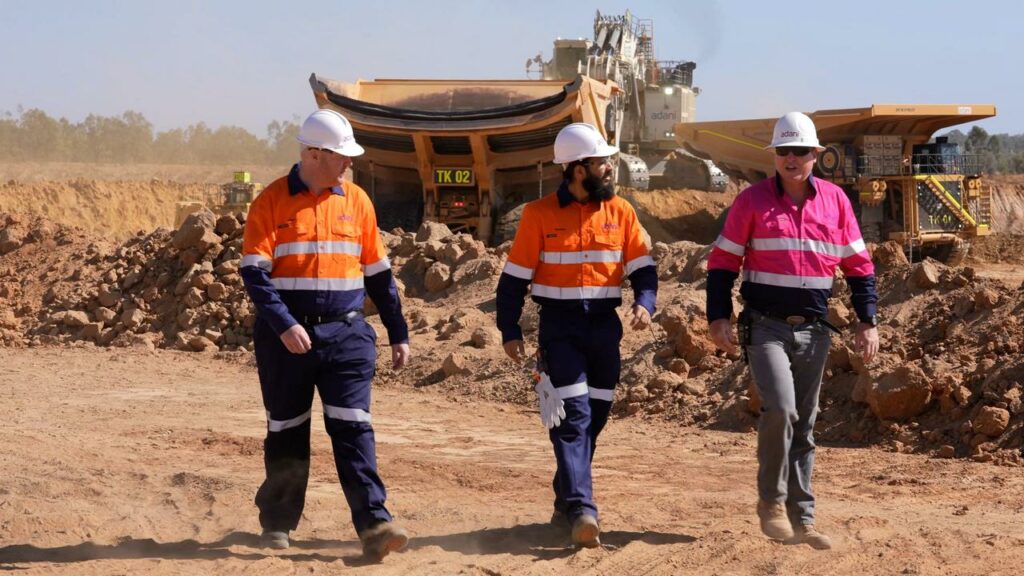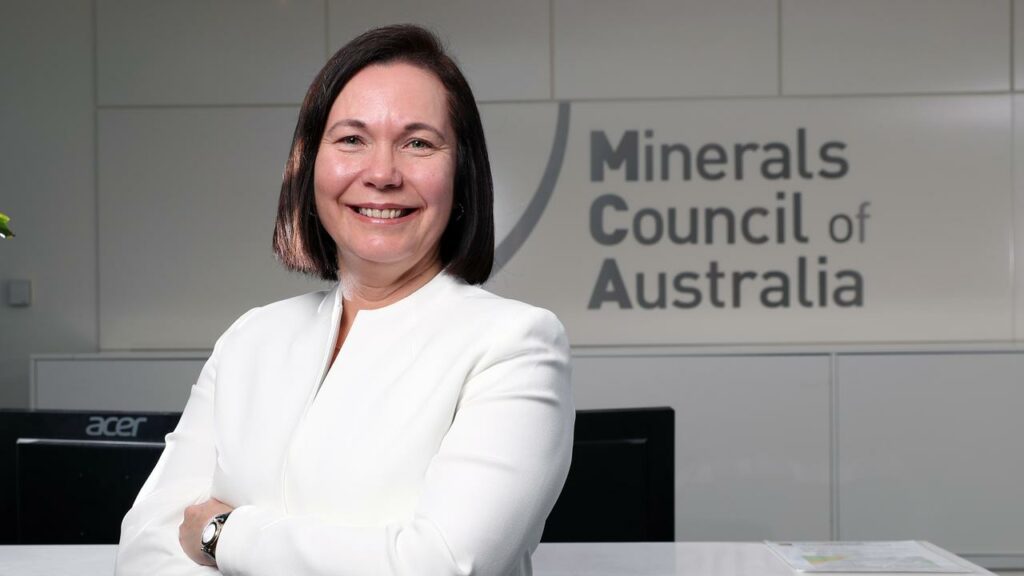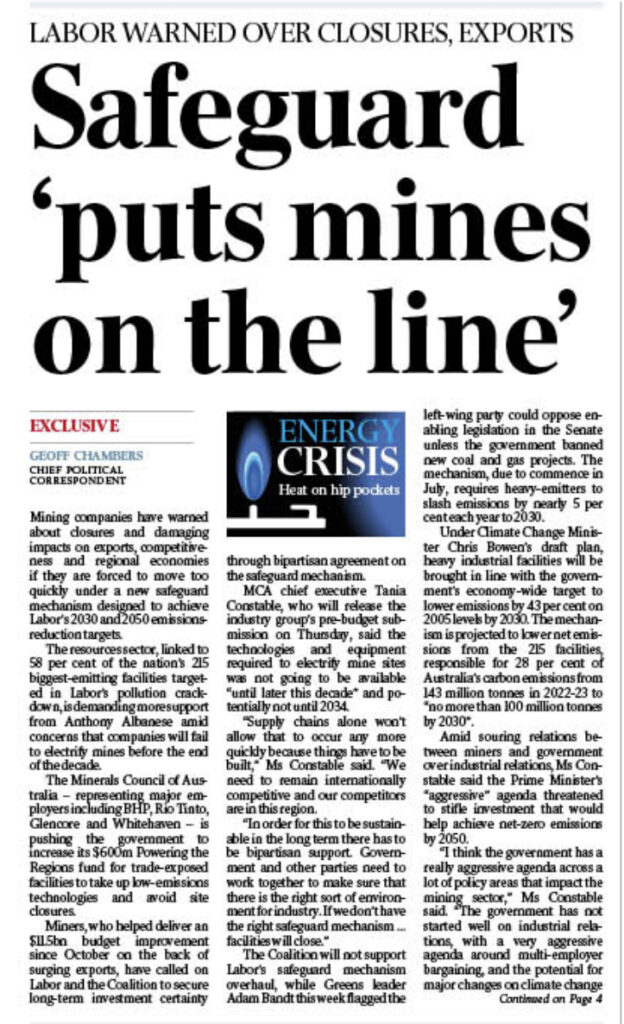
Article by Geoff Chambers courtesy of The Australian.

Mining companies have warned about closures and damaging impacts on exports, competitiveness and regional economies if they are forced to move too quickly under a new safeguard mechanism designed to achieve Labor’s 2030 and 2050 emissions-reduction targets.
The resources sector, linked to 58 per cent of the nation’s 215 biggest-emitting facilities targeted in Labor’s pollution crackdown, is demanding more support from Anthony Albanese amid concerns that companies will fail to electrify mines before the end of the decade.
The Minerals Council of Australia – representing major employers including BHP, Rio Tinto, Glencore and Whitehaven – is pushing the government to increase its $600m Powering the Regions fund for trade-exposed facilities to take up low-emissions technologies and avoid site closures.
Miners, who helped deliver an $11.5bn budget improvement since October on the back of surging exports, have called on Labor and the Coalition to secure long-term investment certainty through bipartisan agreement on the safeguard mechanism.
MCA chief executive Tania Constable, who will release the industry group’s pre-budget submission on Thursday, said the technologies and equipment required to electrify mine sites was not going to be available “until later this decade” and potentially not until 2034.
“Supply chains alone won’t allow that to occur any more quickly because things have to be built,” Ms Constable said. “We need to remain internationally competitive and our competitors are in this region.
“In order for this to be sustainable in the long term there has to be bipartisan support. Government and other parties need to work together to make sure that there is the right sort of environment for industry. If we don’t have the right safeguard mechanism … facilities will close.”

The Coalition will not support Labor’s safeguard mechanism overhaul, while Greens leader Adam Bandt this week flagged the left-wing party could oppose enabling legislation in the Senate unless the government banned new coal and gas projects. The mechanism, due to commence in July, requires heavy-emitters to slash emissions by nearly 5 per cent each year to 2030.
Under Climate Change Minister Chris Bowen’s draft plan, heavy industrial facilities will be brought in line with the government’s economy-wide target to lower emissions by 43 per cent on 2005 levels by 2030. The mechanism is projected to lower net emissions from the 215 facilities, responsible for 28 per cent of Australia’s carbon emissions from 143 million tonnes in 2022-23 to “no more than 100 million tonnes by 2030”.
Amid souring relations between miners and government over industrial relations, Ms Constable said the Prime Minister’s “aggressive” agenda threatened to stifle investment that would help achieve net-zero emissions by 2050.
“I think the government has a really aggressive agenda across a lot of policy areas that impact the mining sector,” Ms Constable said. “The government has not started well on industrial relations, with a very aggressive agenda around multi-employer bargaining, and the potential for major changes on climate change and environmental approvals. When you put all those things together, companies look at investing in Australia and say why would we invest in Australia? It’s so much harder when you put all of those policies together than investing elsewhere.”
Ms Constable also raised concerns over plans flagged by Jim Chalmers to establish a sustainable finance architecture, including a “new taxonomy to label the climate impact of different investments”. The Treasurer’s 6000-word essay, published by The Monthly, said investors would be able to assess the climate-risk rating of a firm and allow regulators to “stamp-out greenwashing”.
With companies adopting ambitious net-zero targets in response to climate-investor pressure, Ms Constable said miners were prioritising and updating investors on their environmental, social and governance policies.
The MCA chief urged against “reinventing the wheel” and said “we don’t need” another level of government oversight.
“Business needs to get on with what we’re good at,” she said. “Governments need to collaborate and co-operate and not be at the centre of those decisions. They need to be facilitators and good partners.”
Institute of Public Affairs research to be released on Thursday shows that 84 per cent of the 215 facilities impacted by the safeguard mechanism are in regional Australia, with 88 per cent linked to critical economic sectors including coal, gas, oil, manufacturing and mining. In a submission to the Senate environment committee inquiry into the government’s safeguard mechanism (crediting) amendment bill, the IPA said the added regulatory burden that the bill would put on those facilities would put at risk thousands of jobs.
IPA deputy executive director Daniel Wild said the Greens’ demands to scrap new coal and gas projects would “cost $268.5bn in forgone economic activity, both direct and indirect”.
“Ending new coal and gas would result in the cancellation of 86 projects currently in the construction pipeline (and) the cancellation of approximately 473,000 jobs,” Mr Wild said.
The MCA, which has been locked in consultation with Mr Bowen since last year, has welcomed government moves to include a cap on the price of carbon credits to offset emissions. But Ms Constable said the $600m Powering the Regions fund, which would assist in reducing “the risk of facility closure and carbon leakage”, was inadequate.
She said miners supported containment measures and “clarity around the price of Australian Carbon Credit Units in terms of offsetting emissions that might go beyond what an individual company’s baseline is”.
The MCA pre-budget submission, which advocates for IR rules that boost productivity and wages, urges the government to speed up project approvals, avoid new or additional taxes and reduce the corporate tax rate to the OECD average. The submission says safeguard mechanism changes must not put Australian businesses at a competitive disadvantage to foreign businesses not subject to similar constraints.
Ms Constable said global efforts to decarbonise would require “astronomical” volumes of minerals and metals. By 2030, 50 new lithium mines, 60 new nickel mines and 17 new cobalt mines would be required to meet demand for electricity storage.
